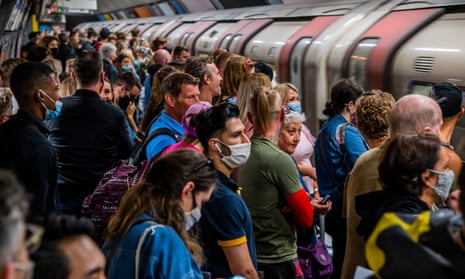As September approaches, employers are increasingly asking workers to come in, with many offices adopting hybrid systems after months of working from home – prompting mixed emotions. Commuting can be both expensive and polluting. UK workers pay more of their salary in commuting costs than their EU counterparts and, before the pandemic, two-thirds of people travelled to work by car. But despite the costs, which also include time, some value the commute for separating their home and work lives.
Seven people speak about how their commutes and their perspectives on travelling to work have changed since the onset of the pandemic
‘I can’t keep doing this commute’

Phil Harris, who travels in to London from Horsham in West Sussex, says the cost of train tickets has increased since the start of the pandemic and that he is “absolutely sick” of commuting. “The rail replacement weekends are harder to stomach when there has been so much time to fix things,” says the 54-year-old.
Before the pandemic Harris travelled on the 6.44am Southern train from Littlehaven to London Victoria, but the service is no longer running, which means walking farther to Horsham station. “My dilemma is that I don’t want to change jobs because I love what I do, but I can’t keep doing this commute,” says Harris, who works in tourism.
Due to the low numbers of tourists, Harris now starts work at 10am and gets the 8.50 train from Horsham, arriving at London Victoria at 9.43. His weekly ticket costs £110, which is more expensive than before the pandemic when his employer would give him a season ticket loan of £100 a week for 40 weeks. “You would think working later would be cheaper, but with Southern rail those fares start on trains arriving into London after 10am. I’m utterly sick of it all,” he says.
‘I don’t want to be on the tube in rush hour’

Before the pandemic Tim Pitt’s job as a document controller on construction projects sometimes meant commuting for more than an hour each morning to sites across London. “I spent my entire working life taking tubes, trains and buses,” says the 56-year-old. “It’s quite stressful, getting to work and fighting for a seat.”
After that job ended with lockdown, he started working closer to home, doing cleaning shifts at his local Wetherspoon’s and later working at vaccination centres in Waltham Forest, north-east London. “It made me see how the commute starts the working day with stress,” he says, adding that walking to work means he can “relax and arrive fresh and ready for the day”.
Pitt, who is now looking for full-time work, says he would prioritise a job that does not involve taking the tube – particularly while Covid cases remain high. “I really don’t want to be on the tube in rush hour, even with my mask on, because a lot of people aren’t wearing masks. I’ve been double jabbed, but the tube is an incubator for the virus.”
‘Commuting gave me time to transition from being a mum to being a colleague’

Christina Cage, a 38-year-old chartered accountant in Edinburgh, did not appreciate how important her commute was until she stopped doing it. “I came to realise that my commute was a time where I could transition from being a mum to becoming a colleague with a bit of space in between to myself,” says Cage, who has two young children. “Overnight it became a threshold of a door that didn’t close.
“It’s not because I like sitting in crowded spaces with strangers or in traffic – it’s because it’s the only time, especially if you’re a busy parent, that you get to have that headspace to look out the window, read a book, listen to music or cycle. You’ve got a gift in that time when you have to move from one physical location to another – I didn’t appreciate how necessary that was for my mental health.”
Cage says her office is discussing a hybrid-working pattern, and though she thinks it would be “quite stressful” to return to commuting every day, she is looking forward to commuting on some days. “In the lighter months of the year I sometimes cycle in, so that gives me the space and time to do some exercise I wouldn’t have done otherwise,” she adds.
‘My salary has fallen and I can’t afford to commute’
When Evie, a personal assistant in Essex, was job-hunting last summer after her contract ended, she realised salaries had been slashed. “It’s been really brutal. A lot of employers are no longer paying London weighting as people are working from home,” says the 50-year-old.
She thinks salaries need to be brought back to pre-Covid levels to reflect commuting costs. “Employers should say: ‘We started your contract when everyone was working at home – we’re going to want you back in the office, so we’re going to increase your salary to reflect that’,” she says.
Evie is on a significantly lower salary than she used to be, and is struggling financially now her employer wants her to start coming into the office in London twice a week. “My son’s just finished university and we’ve only got my income. I’d love to be able to go in two out of five days a week, but I can’t. I can’t afford to give [my boss] a third of my salary, and I’ll be going into the office for no reason. I’ll miss several hours of work by travelling in, just to say he sees my face,” she says, adding: “There’s never any mention of Covid.”
‘Once I started cycling, the thought of getting the tube was unbearable’

After changing jobs during the pandemic, the 36-year-old lawyer Anisha Kohli’s commute went from being a 20-minute walk to spending 45 minutes on the tube. “I just couldn’t bear it: the added expense, time taken and the stress of dealing with the commute during a pandemic, adding to the fact that half the stations were under maintenance,” she says. “On a lark, I ended up cycling home on a Santander bike one day. Within a week I bought myself a ridiculously adorable pink bike with a wicker basket and now cycle to work every day.”
Kohli, who has since completed a cycling course run by her local council, says an added incentive is that she is lucky enough to have a “dream cycle route” through Hyde Park and St James’s Park to her office in Kensington.
“Once I started cycling, just the thought of getting the tube was unbearable, even if it’s raining or I’m super tired.” However, the one thing she is worried about as a cyclist is air pollution: “I live in the congestion zone, on a very busy street, and I feel the vehicle pollution intensely.”
‘My commute used to produce a massive, unnecessary carbon footprint’

Commuting for Chris Procter, a 47-year-old loss adjuster in Kent, used to mean spending anywhere between 45 and 90 minutes on the motorway. Now it involves a short walk into the living room. “At the end of the day, even after 17 months of working at home, I still sadly pop out of the front door before bursting back in to announce I am home,” says Procter. “My teenage kids kindly remind me it wasn’t funny on day one, but the dog still gets excited despite only seeing me seconds before.”
There are no viable public transport options in his area, and Procter has seen a huge benefit to his wellbeing from not having to drive. “I really value having more time in the morning. I sit and read before work and it chills me out. At lunchtime, I can go out and walk in the woods with the dog – we’re semi-rural here. Even if it’s raining, it’s a really nice break. I have more time with the kids. It’s lovely.”
In light of the climate crisis, Procter also thinks his commute, which used to produce “a massive, unnecessary carbon footprint” is “ethically questionable”. He said: “I don’t think I will fly again – and it seems stupid making those kind of decisions, but at the same time sitting in a car stuck on a motorway, day in, day out, polluting the planet, when there is a really good solution that we can use.”
‘Not travelling was transformational from a health perspective’
Tania used to regularly travel for more than six hours to meet partners in different UK cities for her job in international cultural relations. The 32-year-old, who used to live in Manchester but moved to Newcastle upon Tyne during lockdown, was “constantly exhausted”. As her office considers how employees can return, Tania has applied to be a home worker.
“Not traveling was transformational from a health perspective – weight and skin and all of that sort of stuff,” she says. “It’s the difference between getting up at 5:30 and getting home at 9pm, and getting up at 7 or 8, doing yoga, then maybe going for a lunchtime run.
“I think my average exercise was like, twice a year when I was traveling, and now it’s about four times a week. Not to mention that I can make freshly cooked lunches and have a much better diet without consuming endless lattes and Pret lunches.”
